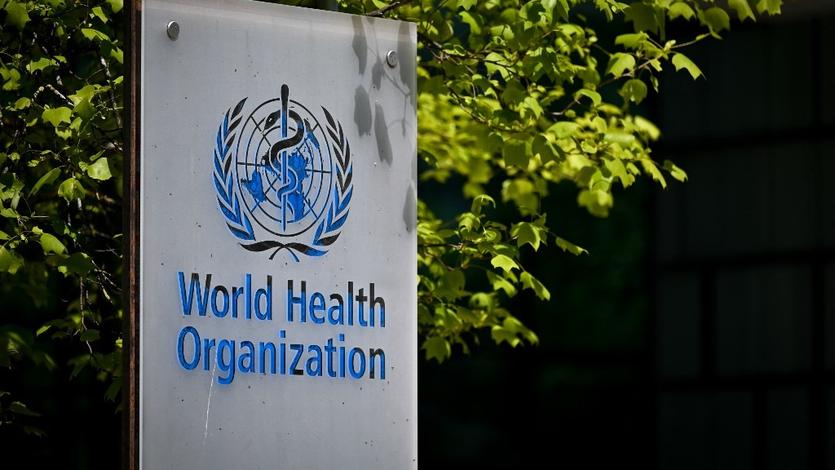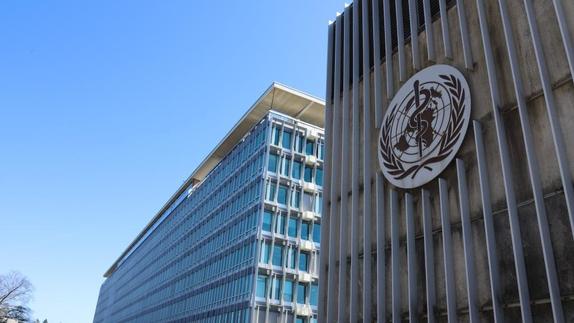 A picture taken on May 8, 2021 shows a sign of the World Health Organization at the entrance of their headquarters in Geneva amid the COVID-19 outbreak. (FABRICE COFFRINI / AFP)
A picture taken on May 8, 2021 shows a sign of the World Health Organization at the entrance of their headquarters in Geneva amid the COVID-19 outbreak. (FABRICE COFFRINI / AFP)
The World Health Organization (WHO) said on Monday that COVID-19 continues to constitute a public health emergency of international concern, its highest form of alert.
The pandemic was likely in a "transition point" that continues to need careful management to "mitigate the potential negative consequences", the agency added in a statement.
The advent of vaccines and treatments has changed the pandemic situation considerably since 2020, and WHO Director-General Tedros Adhanom Ghebreyesus has said he hopes to see an end to the emergency this year, particularly if access to the counter-measures can be improved globally
It is three years since the WHO first declared that COVID represented a global health emergency. More than 6.8 million people have died during the outbreak, which has touched every country on Earth, ravaging communities and economies.
However, the advent of vaccines and treatments has changed the pandemic situation considerably since 2020, and WHO Director-General Tedros Adhanom Ghebreyesus has said he hopes to see an end to the emergency this year, particularly if access to the counter-measures can be improved globally.
"We remain hopeful that in the coming year, the world will transition to a new phase in which we reduce (COVID) hospitalizations and deaths to their lowest possible level,” Tedros told a separate WHO meeting on Monday.
ALSO READ: As WHO pandemic pact talks begin, poor nations on back foot
Advisers to the WHO expert committee on the pandemic's status told Reuters in December that it was likely not the moment to end the emergency.
Meanwhile, the WHO will push at its board meeting this week for an expanded role in tackling the next global health emergency after COVID-19, but is still seeking answers on how to fund it, according to health policy experts.
The Geneva meeting sets the program for the UN agency this year – as well as its future budget – with the WHO facing two key challenges: a world that expects ever more from its leading health body, but which has not yet proven willing to fund it to tackle those challenges.
At the Executive Board's annual meeting from Jan 30-Feb 7, countries will give feedback on Ghebreyesus' global strategy to strengthen readiness for the next pandemic which includes a binding treaty currently being negotiated."I think the focus is very much on the program budget, then sustainable financing," Timothy Armstrong, WHO director for governing bodies, told journalists when asked about the agenda.
Also on his list was "the position of the World Health Organization, recognizing there is a need for a reinforced central role for WHO" in the global health emergency system.
ALSO READ: First steps in reforming global health emergency rules adopted
The WHO is seeking a record $6.86 billion for the 2024-2025 budget, saying that approving this sum would be "a historic move towards a more empowered and independent WHO".
But approval will require member states to make good on promises made last year to hike mandatory fees - a fact which is uncertain since the deal was always subject to conditions.
"What we are currently seeing is that some member states are now trying to pre-condition lots of things," said a source close to the talks, saying it "remains to be seen" if all countries will commit to raising fees. Reuters could not immediately establish which countries might withhold support.
The current base budget, which does not include the funding changes, has a nearly $1 billion financing hole, a WHO document showed – although that gap is not unusual at this point, two sources added. However, one did add that it was "absurd" that the WHO still has to scrabble for money after COVID-19.
"It's a huge knot," said Nicoletta Dentico, the co-chair of the civil society platform the Geneval Global Health Hub. "The weakness of WHO is under our eyes."
 This photo dated March 30, 2021 shows an exterior view of the World Health Organization headquarters in Geneva, Switzerland. (PHOTO / XINHUA)
This photo dated March 30, 2021 shows an exterior view of the World Health Organization headquarters in Geneva, Switzerland. (PHOTO / XINHUA)
The WHO, which celebrates its 75-year anniversary having been set up in 1948, will also use the meeting in Geneva to advocate for a boosted role in pandemic preparedness, documents showed
The agency is also considering starting big replenishment rounds every few years to top up its coffers, a document showed.
Pandemic preparation
The WHO, which celebrates its 75-year anniversary having been set up in 1948, will also use the meeting to advocate for a boosted role in pandemic preparedness, documents showed.
Tedros will call for a Global Health Emergency Council to be set up linked to WHO governance. However, external experts have said such a council needs higher-level political leadership.
READ MORE: Virus cooperation stressed as Europe nears 1m deaths
"Given that pandemic threats involve and impact almost every sector, it must be an outcome of a UN General Assembly resolution, be appointed by and accountable to it," Helen Clark, former prime minister of New Zealand and head of the independent panel set up to review the handling of COVID, told Reuters.


